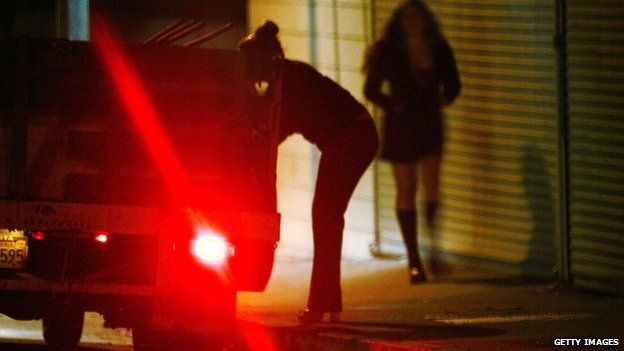Poetry eases pain of teen who was sold for sex
- Published

Across America, whether on the internet or in shadowy parking lots, young girls are sold for sex. Some of the girls have been encouraged to write stories of their abuse as part of the recovery process.
Bella, 15, has a smile that lights up the room. (Her name has been changed to protect her identity.) As we sit and chat at the Gateways programme in Westchester, she has a binder in front of her.
On the front is a drawing of Hunts Point, the section of New York's Bronx borough where Bella was sold for sex by her pimp.
In her picture, she stands on the street while her pimp watches over her. Inside the binder, she has written the story of her initiation into "the Life", as girls call the business of being sold for sex.
"For a while I thought you actually cared," she writes of her pimp.
"Till you brought me downstairs and you taught me the game. I did as I was told. My first client of the night took me to a hotel. He beat me, [had sex with me], then robbed me at 3 am.
"When I finally walked back to Hunts Point you screamed at me... I was terrified but you still made me go out there again."
Ernie Allen, a former president of the National Center for Missing and Exploited Children, says at least 100,000 children are sexually trafficked each year in the US. This week, US authorities announced the rescue of 168 children and arrest of 281 pimps in a 100-city sex-trafficking sting.
Gateways, run by the Jewish Child Care Association, is a residential programme to help children who have been commercially sexually exploited.
Bella ran away from her home in New York City at 14 after a row with her grandfather. She soon met the man who was to become her pimp. Initially she was flattered.
Walking the streets of Hunts Point and charging for sex seemed like an easy way to make money, at first.
"I could get $80 (£47) or $90 from a client," Bella told me. "I split it 50-50 with my pimp."
While he sat in a nearby McDonald's, Bella would see as many as 20 clients in a night - some violent. In her writing, she has explored why she put herself through this ordeal, night after night.
"Pimps know how to control young girls like myself that have low self-esteem, who are homeless, need money and a place to sleep at night... I felt I needed someone, I needed attention and I just wanted someone to care and protect me and love me.
"I knew he was lying the whole time but I still felt I needed him around."
Bella's pimp was what Janmarie Brown, the director of the Gateways programme, calls a guerrilla pimp - meaning he was violent.
"There are also gentlemen pimps," explains Ms Brown. "He doesn't put his hands on you but he uses his words to control you."
Girls such as Bella are robbed of their childhood. They never "jumped rope or played in a sprinkler", says Ms Brown.
Bella was eventually arrested and referred by a court to Gateways, where the aim is to provide a path "to a new future for children who have endured sexual exploitation".
Teens and prostitution
•The initial age of entry into commercial sex is 12-14
•The main compensation homeless teenagers receive for commercial sex is not money but a place to stay
•Most of the adults who force children into commercial sex are not strangers but family members
•More than three-fourths of teenagers in the commercial sex industry have a history of childhood rape
Source: Covenant House (2013)
While at Gateways, Bella has been in therapy, gone to school, and taken part in Project Impact, where the girls write their stories and have an opportunity to advocate for changes in the law.
Bella went to the state capital, Albany, to meet legislators who are considering new laws to protect children.
"We need to hold pimps accountable," she has written. "They are the true criminals. He manipulated me and persuaded me into the Life. He should have a higher penalty than the buyers [of sex] because if it wasn't for pimps a lot of girls would not be doing this."
Lauren Hersh, a former prosecutor of sex trafficking cases who runs Project Impact, says Bella had a profound effect on the legislators who met her.
"She was amazing, she was powerful and one lawmaker teared up when she told her story," says Ms Hersh. "Her advocacy, her ability to articulate why these changes should be made shone through."
Recently, lawmakers in Albany considered whether to increase the penalties for those who buy sex from children, and make sex trafficking into a violent felony. But the bill was never brought to the floor for a vote.
Bella is soon to leave Gateways, her haven for the past few months, and return home. She says she has found writing and sharing her story to be a helpful experience.
"I got to express my feelings, with people that didn't judge me," she explains.
One of her poems reads like an anthem to her recovery.
"I rose from the dark into the light but don't think it was easy," she writes. "I had to put up a fight. The past was hard to overcome but what's done is done."
She wants to graduate from high school, go to college and become a physician's assistant. A friend has contacted her to suggest they return to "the Life", using the friend's boyfriend's car to see clients.
Bella shakes her head and makes it clear she's not doing that.
"Those streets of Hunts Point changed me, but it didn't break me," she writes.
- Published23 June 2014